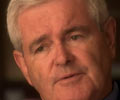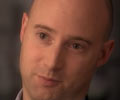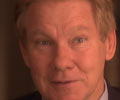- People
- Newt Gingrich
- Michael Oreskes
- Matt Bai
- Tom Davis
- Bill Bishop
- Anne Kornblut
- Related Link
- Change We Really Believe In?
An essay by Paul Stekler, co-producer and co-writer of The Choice 2008
Newt Gingrich Former House speaker, 1995-'99 (R-Ga.)

The biggest message of 2006 and 2008 is that the American people are fed up with the lack of effective leadership and that they will keep firing people until they get fundamental change. I think it actually says more about the country than it says about Obama and McCain.
What does it say about the country?
That this is a country that overwhelmingly knows that the current policies aren't working and the current institutions aren't functioning. And it's a country which is increasingly worried about some combination of energy, the environment, health care cost, the decaying education system, the rise of China and the threat of foreign terrorism. And all of those are swirling around together in a formula which says to people we're not going to be able to succeed unless we have very real change.
I asked an audience recently, out of 400 fairly sophisticated people, how many of them felt we could compete with China 20 years from now without real change. And none of them raised their hand. One guy yelled, "We can't compete with them now!" And so I think there's a sense of the political class having failed, and wanting very dramatic, very bold new initiatives.
Michael Oreskes International Herald Tribune

It's a time of deep disenchantment and alienation, probably as bad as we've ever seen. There are a variety of measures that pollsters and political people, social scientists use. The measure in which pollsters go out and ask voters, "Do you think the country is on the right track?" 80 percent of the country says, "No, we're on the wrong track." That's a very negative view of the state of affairs in the country.
Similarly, when you ask consumers, how confident are they about the future of the economy, you get very negative results. These are all different ways of measuring the same fundamental question, which is the country's pretty deeply disillusioned right now. And it's a disillusionment, I think, that is [over] a set of events. It's not disillusionment because of one factor. It's a feeling of ineffectiveness, frustration. It's a feeling that the country isn't dealing with its problems. The country is powerless against a lot of forces.
One of the problems is that Americans aren't used to feeling that way. A lot of the rest of the world is used to the idea that someone else sets the price of oil, or someone else is in control of their fate in some way. Americans don't like that idea. So some of what's wrong in the United States right now is not that our lives are objectively worse than they've been in the past. In fact, in many ways they're objectively much better. What's wrong is that our expectations have been frustrated in a very severe way. Americans are feeling the limits of American strength, American effectiveness, American power, and it's a rude awakening. And I think that's contributed, to a very large extent, [to] this sense of things going off on the wrong track. … It's a big psychic hole that the country has to dig out of. …
Matt Bai The New York Times Magazine; author, The Argument

Having covered politics over the last decade, and especially out in the states, having seen Jessie Ventura in Minnesota, … having seen what Ross Perot had accomplished in the Reform Party, having seen what Arnold Schwarzenegger would do in California, there's something happening in politics that mirrors really what's happening in society -- in fact, lags what's happening in society -- which is that expertise and experience that were so traditionally valued, have less value actually in the modern culture.
We've become a society of self-experts. This is what the blog culture is, this is what the Internet is, this is what Wikipedia is for, right? In a sense, we no longer trust large institutions. We no longer trust experts. We trust ourselves. And we don't have the same kind of hierarchical approach to information and expertise that we did.
So for a guy like Obama to run with virtually no experience, 20 years ago would have been highly, highly unlikely, perhaps impossible. It's very rare moments in history when somebody with that level of experience [is able] to get a serious hearing for the nation's highest office. …
And I would have told you the same thing in 2004, that this is not a moment where people are valuing that kind of traditional resume experience. They're looking for something different. They're willing to trust their own instincts. They're willing to trust other people's instincts.
So there was a sort of broad fire burning under America that wasn't yet visible. There wasn't even any smoke, really, but you could feel it.
… People say, "Well, the Internet and the Internet culture is changing politics. Well, that's not true; it's not changing politics. It's actually changing everything. And politics, as it almost always is, is the last of the American institutions to catch up. People in business get this. People in other industries, in other walks of life get this, because it's been changing their world for awhile now.
And so in politics these value shifts -- the de-emphasis of expertise and experience and sort of hierarchical positioning, and the new value placed on the ability to express oneself and communicate and inspire people, and the ability to hear and converse and exchange with people, rather than simply tell them what it is they should believe -- that is now permeating politics in a very real way. It has over the last several years. And Obama is, to some extent, an outgrowth of that.
So it's a bottom-up idea.
Yes, it is.
Tom Davis Representative (R-Va.)

Everybody wants change, but you'll find more often than not in American history sometimes the change is worse than what you had before. This is a very unpopular regime, very unpopular president, very unpopular war, tough economy. But changing suits doesn't necessarily make anything better.
There are reasons we're in the situation we are today, and the reasons aren't just Republican reasons or Democratic reasons. The reasons are the inability of political leadership to bring all the elements to the table and come up with a solution. Everybody's got a plan. Can you implement that plan? Can you get it done?
What we have seen, in my opinion, over the last 16 years, Republican and Democrat, is kicking the can down the road, trying to hope these problems don't catch up with this administration. And I think that payday's coming. We're going to have to start making decisions. If these were easy decisions, they would have been made a long time ago, and politicians would have taken credit.
We're at a situation now where there are no easy solutions. The retirement of the [baby] boomers' generation, and what this does to federal entitlement programs, is a very serious issue that the bill's come due. If you pay those bills, somebody's taxes are going to get raised astronomically, or somebody's benefits are going to get cut. You can't have everything. It's got to change.
Energy independence -- we can't afford to just sit here at this point and be dependent on a bunch of dysfunctional countries around the world for energy supply while consumers and businesses are paying through the teeth. It's just unacceptable. Yet, very little has happened. And this crisis goes back to Jimmy Carter.
American competitiveness? We're fall[ing] behind the rest of the world right now in our ability to produce goods efficiently and to keep our economy going, particularly with China and India and the Pacific Rim stepping onto the global marketplace. Right now, the rhetoric of this campaign, we're going backwards on trade. We're going backwards on education reform. We're not addressing immigration. These are all key components to staying competitive. And yet no one wants to have an honest discussion because we're uncomfortable with those discussions and political leaders are risk adverse.
What I want in a leader, Republican or Democrat, and I think the people want somebody who's going to take these head-on and come up with some solutions. And we haven't seen it in a long time.
Bill Bishop Author, The Big Sort
We essentially live our lives now as no-compromise consumers, and we apply that same attitude to our politics. We want our process to look like it's fair, and that people are getting along. But in terms of what we want as individuals, we don't want compromise. We want our side to win.
And we're so encased in our groups, that's the way we see the world: "It's those other people who are screwing things up. If only they would go with the majority, people like me, everything would be fine." And so the uniter and divider, the man from Hope, Clinton, the candidate of hope and post-partisanship, are always good ways to run a campaign, because people perceive that the process is broken and lacks this general understanding and this willingness to get along. But when it comes time to actually get along and do things, no, it's the other side that ought to do the compromising, not me.
Anne Kornblut The Washington Post

Do you see something different in the way the voters are viewing this election?
Oh, there's no question voters find this election more consequential. You see the passion in people's faces. You see the tears. You hear the level of involvement, people actually going out and getting engaged and involved. I will never forget going to a rally in the 2000 election -- it was a Bush rally -- and interviewing a voter who we asked, "Why are you voting for Bush?" And she said, "I just like the way he did the job last time." And we realized she thought it was George Bush Sr.
There's no one making that mistake this time. Everybody is tuned in. No one's going to describe this the way they described 2000, as the Jerry Seinfeld election about nothing, where you could debate what to do with the surplus. … And I think the level of young-voter turnout is a sign of how consequential it feels.
And all these big, consequential things have happened in the last eight years -- not just 9/11, but Katrina, all the sort of natural disasters, the environment. Al Gore has gone from being sore loser man to being a Nobel Prize winner on that issue alone. The world has sort of turned on its head in that amount of time, and you see it. I see it in the letters I get from readers about issues. It just feels real in a way that it didn't, even in 2000.